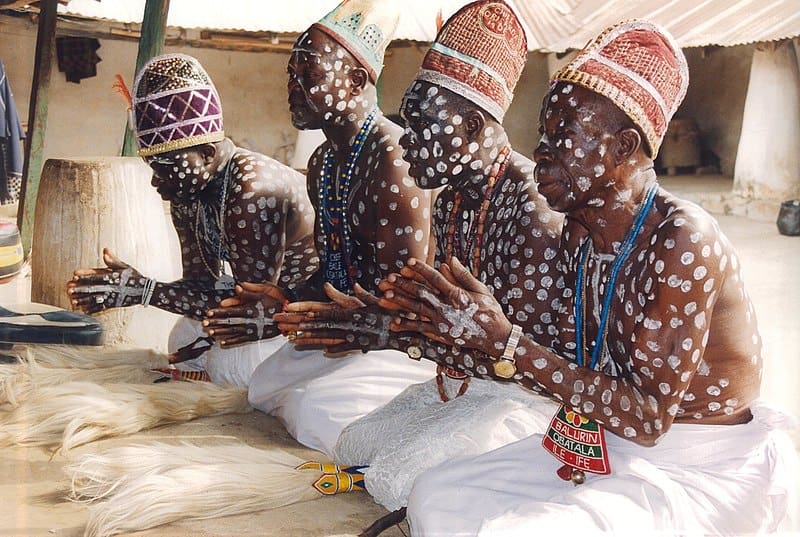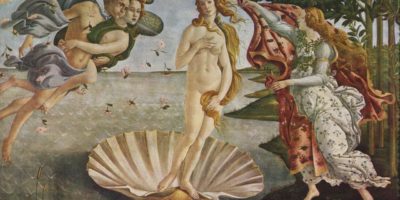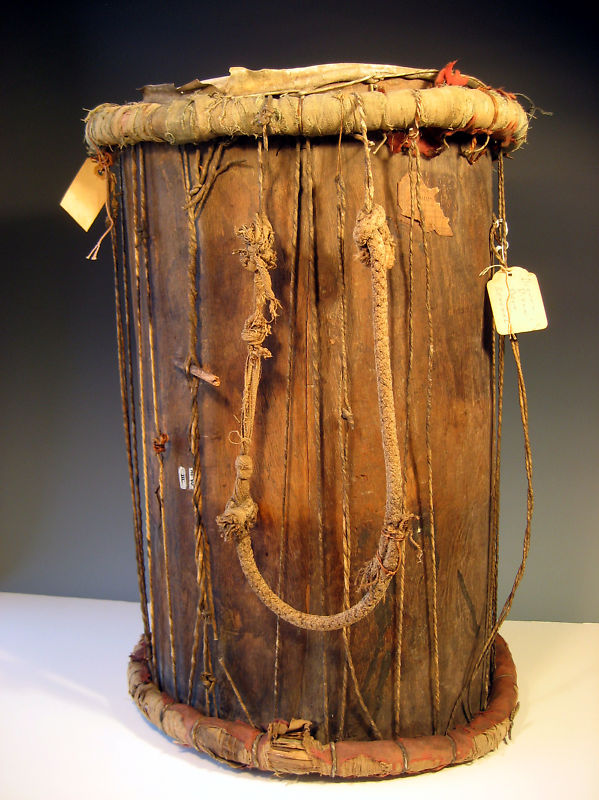30 Unique African Traditional Religions That Will Blow Your Mind
Africa, the cradle of civilization, is not just a continent of diverse landscapes, wildlife and cultures. From the mystical rituals of the Yoruba people of Nigeria to the eerie reverence of the ancestors of the Akan people of Ghana, these ancient belief systems are incredibly strange Journey through the mystical rituals of the San Bushmen, who find divinity in the heart of the Kalahari Desert, or marvel at the polytheistic wonders of the Dahomey religion, where gods and spirits perform in mesmerizing rhythms the.
Whether you’re a curious traveler or an intrepid explorer, our journey through these ancient practices will ignite your imagination and inspire you to delve deeper into the fascinating traditional African religions in. Get ready for a journey of the mind and soul, where surprises await at every turn.
1. The Yoruba Religion: the Mystique of the Orishas and its Transcontinental Evolution

Ann Porteus from Tasmania, Australia, CC BY 2.0, via Wikimedia Commons
The Yoruba religion, which hails from West Africa, is a really fascinating and intricate set of beliefs. It’s like this big, colorful mosaic of ideas and stories that they follow. The heart of it is all about the Orishas, these super important god-like figures run the show. Each Orisha has its own thing going on, like being in charge of the weather, or love, or wisdom. And get this, they’re often linked to everyday stuff, like animals, natural things, and even bits and pieces of what makes us humans tick.
But here’s the cool part – this belief system didn’t just stay put in Africa. It traveled across the ocean to the Americas, mixed and mingled with other traditions, giving birth to new practices like Santeria in Cuba and Candomblé in Brazil. It’s a real journey of culture and spirituality that’s still evolving today.
2. Vodou (Voodoo)- the Realm of Loa Spirits
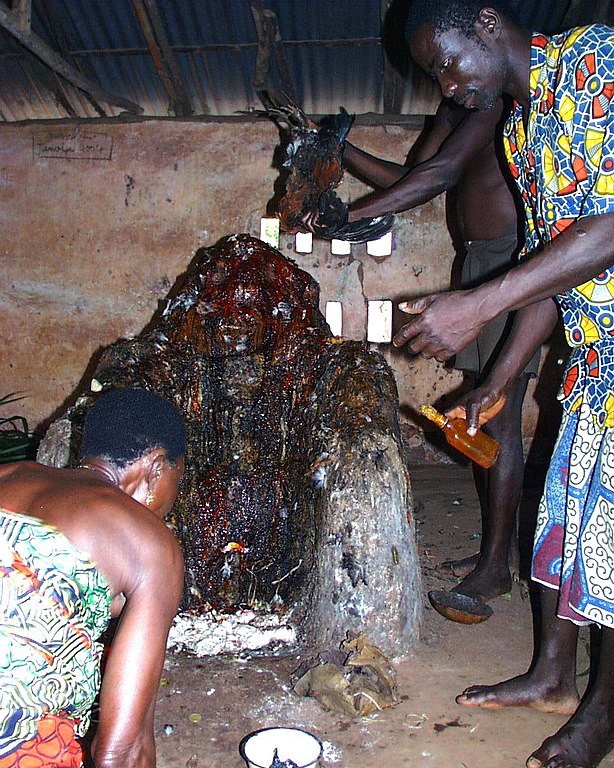
Niamey00, CC BY-SA 4.0, via Wikimedia Commons
Vodou, often referred to as Voodoo, is an enchanting faith deeply rooted in African heritage. It can be predominantly found in Haiti and certain regions of West Africa. This remarkable belief system combines elements of African traditions, Catholicism, and indigenous spiritual beliefs into a harmonious whole. At the core of Vodou are the Loa spirits, acting as intermediaries between ordinary individuals like us and the realm of spirits.
Their connection is established through vibrant dancing and melodious music, evoking a lively celebration for these ethereal beings. Additionally, offerings are made to appease these Loa spirits, similar to presenting gifts to maintain their contentment. In essence, Vodou serves as a bridge connecting our mortal world with the supernatural realm—a concept that never ceases to captivate one’s imagination.
3. Maguzanci/Bori Religion
The traditional religion of the Hausa people, an ethnic group primarily found in Northern Nigeria and Southern Niger, is known as Hausa animism. Maguzanci or Bori is a pre-Islamic traditional religion of the Hausa people of West Africa that involves magic and spirit possession. This traditional religious system is characterized by the belief in the existence of a supreme being, spirits, and ancestors. These spirits are an important part of their world, and they give life a special kind of meaning.
Even when they’re not feeling their best, their approach to healthcare is tied to these age-old traditions. It’s like a secret world of wonder and tradition that’s part of their everyday journey. Although Islam has significantly influenced the Hausa culture, there are still remnants of their indigenous religious practices that have persisted over time.
4. The Kushite religion
The Kushite religion, practiced in the ancient Kingdom of Kush (modern-day Sudan), blended indigenous customs with influences from Egyptian beliefs. Key deities included Apedemak, the lion-headed god, Amun, and Isis. Rituals involved temple worship, offerings, and ceremonies dedicated to seeking divine protection and favor. Notable religious structures like the Temple of Amun at Jebel Barkal served as focal points for worship and pilgrimage.
Although influenced by Egyptian religion during their rule in Egypt, the Kushites retained their distinctive religious practices. Despite archaeological evidence shedding light on their faith, much remains unknown, spurring ongoing scholarly exploration of this ancient African civilization.
5. Dahomean Traditional Religion
Hailing from the Fon people of Benin, the Dahomey religion unveils a fascinating tapestry of beliefs, deeply woven with reverence for an array of deities and spirits. The Dahomean Traditional Religion is polytheistic, with a pantheon of various gods and goddesses known as the Vodun (or Voodoo) spirits. These deities are believed to have power over various aspects of life, such as nature, fertility, war, and health. At the core of their spiritual cosmos resides Mawu-Lisa, a deity that defies conventional gender roles, embodying a harmonious duality.
Divination is commonly practiced in Dahomean Traditional Religion. It involves the use of various methods, such as reading the patterns of cowrie shells or interpreting the messages from the spirits, to provide insights and guidance on important life decisions and events.
6. Bakongo Ancestor Worship
The Bakongo people of Central Africa deeply cherish their traditional religious beliefs are centered around a form of ancestral worship, known as the cult of the dead. This spiritual foundation profoundly influences their daily lives, transcending routine family gatherings into meaningful connections that bridge generations. They view their forefathers as guiding stars, offering protection and wisdom as they navigate life’s challenges.
Bakongo people believe in the existence of an afterlife where the spirits of the deceased ancestors reside. They believe that the actions of the living can affect the well-being of their ancestors in the afterlife, emphasizing the reciprocal nature of their relationship with the spirit world.
7. Traditional Igbo Religion
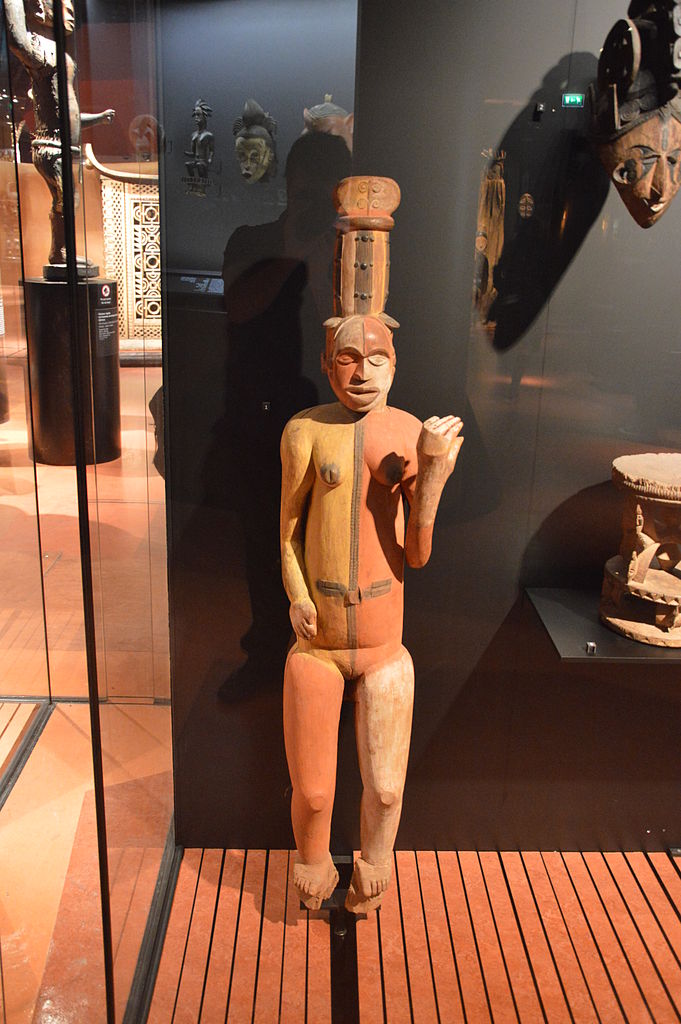
AnonymousUnknown author, Public domain, via Wikimedia Commons
Central to this religion is the belief in a creator god (Chukwu or Chineke), an earth goddess (Ala), and numerous other deities, spirits and ancestors. Igbo religion acknowledges various spiritual forces that are believed to influence different aspects of life, including natural forces, deities associated with natural elements, and spiritual entities that govern specific phenomena. From the storm-wielding Amadioha to the fertility-loving Ala, you best believe these deities mean business. They’ve got devotees wrapped around their celestial fingers, performing rituals for guidance, and seeking cosmic favor.
In summary:
- Igbo religion is a spiritual mixbag of deities and spirits.
- Each deity has their own territory and powers.
- Rituals are the bridge to divine intervention
8. Akan Religion (Fante, Ashanti)

Ddamio, CC BY-SA 4.0, via Wikimedia Commons
In the heart of Ghana, the Fante and Ashanti communities breathe life into the vibrant Akan religion. This tradition pulsates with spiritual energy as it revolves around the adoration of awe-inspiring deities such as Nyame, the all-powerful supreme god, Asase Yaa, the earth goddess who nurtures life, and the cunning trickster god, Anansi. These deities don’t merely occupy pedestals in Akan cosmology; they are woven into the very fabric of life. They’re not just characters in tales but living forces, shaping the daily existence of the Akan people.
- Nyame, the celestial overseer, guides destiny
- Asase Yaa, the earth’s heartbeat, blesses with fertility and abundance
- Anansi, the clever trickster, teaches life’s valuable lessons
9. Ewe Religion
Where Ghana, Togo, and Benin converge, you’ll find the vibrant Ewe people, whose religion is an intriguing tapestry of tradition and spirituality. At its core, Ewe faith centers around the reverence of a diverse pantheon of deities and spirits. These supernatural entities are thought to hold sway over a wide spectrum of existence, from the bountiful fields of agriculture to the precious gift of fertility. Ewe religious ceremonies are a mesmerizing fusion of rhythm, movement, and the mystical.
Drumbeats reverberate through the air, enticing all to sway to the rhythms of the earth. Dancers, their bodies fluid like the rivers that traverse their lands, twirl and stomp in harmonious communion. Meanwhile, divination rituals, like casting the cowrie shells, serve as a spiritual compass guiding adherents through life’s twists and turns.
10. The Zulu Religion

Thembekathwala6, CC BY-SA 4.0, via Wikimedia Commons
The Zulu community of South Africa believes in a diversified array of spirits and has customary religious practices grounded in the veneration of their ancestors. The spiritual framework is an essential and all-intrusive element of Zulu culture, impacting its rites of passage, daily life, and healing methods.
In essence, Zulu spirituality is the core of their society providing a direction, a link to their origins and their own view of the world. If you are in South Africa, the complexity of the Zulu religion is something that one can explore within their culture. In case of any further inquiries, kindly ask.
11. San (Bushman) Religion
The San people of Southern Africa have cultivated a profound spiritual tradition deeply entrenched in animistic beliefs, a belief system wherein everything in the natural world, from the steadfast rocks to the elusive fauna, is believed to house its own unique spirit. This ancient religion, practiced for generations, has a distinct allure that continues to captivate those who seek to understand its intricacies.
This profound and venerable belief system provides a unique lens through which to perceive the world. How do these trance dances facilitate communication with the spirit world? What insights can we glean from this ancient religion that may reshape our understanding of the relationship between humans and the natural world?
12. Religion of the Dinka People

Michael Walsh, CC BY 3.0, via Wikimedia Commons
The Dinka people believe in a high god called Nhialic, who is considered the creator of the world and the source of all life. Nhialic is believed to be the source of rain, which is vital for the survival of their cattle and crops. Ancestor veneration is a significant aspect of the Dinka religious belief system. They believe that their ancestors play a role in mediating between the living and Nhialic. Offerings and sacrifices are often made to honor and appease the spirits of the ancestors.
They have various rituals and ceremonies to honor their ancestors and nature spirits. These ceremonies often involve music, dance, and sacrifices to ensure the well-being of the community and to seek the blessings of the spirits
13. Samburu Religion
The Samburu people are a Nilotic ethnic group in northern Kenya. Their traditional religion, like that of many other African ethnic groups, is largely based on animism and ancestor worship, with a strong belief in the spiritual significance of natural elements and the presence of supernatural forces in the world.
In their relentless pursuit of divine favor and enlightenment, the Samburu partake in an array of sacred practices aimed at forging an unbreakable bond with Ngai. Various rituals and ceremonies are performed to appease the spirits, seek protection, and ensure the well-being of the community. These rituals often involve sacrifices, prayers, and communal gatherings.
The Samburu have traditionally relied on diviners and shamans to interpret the will of the spirits and to communicate with the spiritual realm. These individuals are believed to have special powers and are consulted for guidance and spiritual healing. Certain places and objects are considered sacred, and there are specific taboos that must be adhered to in order to maintain spiritual harmony. Violating these taboos is believed to bring misfortune and displeasure from the spirits.
14. Amazgh Mythology
The traditional religion of the Berber people is known as Berber or Amazigh mythology. This ancient belief system has evolved over thousands of years and has been influenced by various cultural and historical factors. Berber mythology includes a diverse array of spiritual beliefs and practices that are often tied to the natural world, including animism, polytheism, and ancestor worship.
Many elements of Berber mythology are centered around the worship of natural phenomena such as the sun, the moon, and various other celestial bodies. Additionally, there is a strong emphasis on the veneration of local deities associated with specific geographic features, such as mountains, rivers, and forests.
These deities are often believed to embody certain natural forces and are revered for their powers and influences over the environment. While many Berbers have adopted Islam or Christianity, elements of their traditional belief system can still be observed in their cultural practices, rituals, and folklore.
15. The Bambara Religion

TRIP DOWN MEMORY LANE, CC BY-SA 4.0, via Wikimedia Commons
Historically, they have been known for their strong connection to their traditional beliefs and customs. The traditional Bambara religion is a complex system that involves the worship of ancestors and various nature spirits, and it has a significant influence on the cultural practices of the Bambara people. The Bambara religion is characterized by a strong belief in a supreme god called Ngala, who is considered the creator of the universe.
Ngala is believed to be the source of all life and is associated with the sun. In addition to Ngala, the Bambara also believe in various nature spirits that inhabit the natural world, including spirits of the water, earth, and sky. These spirits are often revered and appeased through rituals and ceremonies.
Religious rituals often involve music, dance, sacrifices, and communal gatherings. Ceremonies are held during significant life events such as births, marriages, and funerals, as well as during agricultural activities and seasonal changes.
16. Dogon Religion

Dr. Ondřej Havelka (cestovatel), CC BY-SA 4.0, via Wikimedia Commons
The Dogon people’s faith revolves around Amma, their revered creator god, giving their spirituality a distinct essence. Ancestral spirits, integral to Dogon belief, enrich their religious tapestry with ancestral guidance and protection. This spiritual tradition, an intellectual marvel, has captivated the scholarly world for decades. With unparalleled insight into the cosmos, the Dogon’s sacred rituals are an enigmatic spectacle, resonating with the mysteries of the universe.
The intricate amalgamation of ancient wisdom and divine reverence shapes the very essence of Dogon spirituality. Their compelling cosmic knowledge passed down through generations, is a testament to the human quest for understanding the universe and the connection between humanity and the divine.
17. Serer People traditional Religious Practices
The Serer religion is an ancient religious tradition of the Serer people, who primarily reside in Senegal, the Gambia, and Mauritania. It is often referred to as Serer religion, Serer ancient religion, or Serer traditional religion. The Serer people have a rich spiritual heritage that has been passed down through generations and is deeply intertwined with their cultural identity and social structure.
The Serer religion recognizes a Supreme Deity called Roog ( Rog). Roog is considered the creator of the universe and the source of all life. The religious leaders in the Serer tradition are known as saltigues (singular: saltigue). They are regarded as spiritual intermediaries who communicate with the spiritual realm and guide the community in religious matters.
18. Shona Religion

Shona Witchdoctor. © Hans Hillewaert
The Shona people maintain a strong bond with their ancestral heritage through their traditional religious practices, which are characterized by a deep belief in spirits. This ancient tradition has stood the test of time and revolves around the worship of ancestral spirits who are seen as unwavering and otherworldly companions throughout life’s journey.
For the Shona, these spirits are not just relics of the past, but living entities that continue to have a tangible impact on their everyday lives. With utmost respect and dedication, the Shona navigate the complexities of life, guided by the profound wisdom and kindness of these ancestral spirits.
19. Tumbuka Religion of Zambia
A religious system of an unusual nature is woven from the regions of Malawi and Zambia. The core of the Tumbuka religion lies in reverence for a host of ancestral spirits whose ethereal presence casts an unyielding shadow over the lives of the people. It’s not just a nice ritual but a deep spiritual connection.
The Tumbuka believe in an enchanting cocktail of reverence and harmony with the spirits of their ancestors. This spirit is believed to act as a link between the real and the spirit worlds. Being protectors they show their descendants the intricate path of life that is full of obstacles. The Tumbuka perform a series of rituals designed specifically to develop and enhance the Tumbuka’s relationship with these highly respected spirits.
20. Waaqeffannaa – the Oromo Religion

Rod Waddington from Kergunyah, Australia, CC BY-SA 2.0, via Wikimedia Commons
Waaqeffannaa is the traditional religion of the Oromo people in Ethiopia and Kenya, centered on the worship of the supreme deity Waaq. It is a monotheistic faith emphasizing the interconnectedness of individuals, society, and nature. Cultural rituals, ceremonies, and practices are integral to Waaqeffannaa, serving as mediums through which the community communicates with Waaq and the spirits.
These rituals often include offerings, sacrifices, prayers, and communal gatherings, reinforcing social cohesion and a sense of shared identity among the Oromo people. Despite historical influences from Islam and Christianity, Waaqeffannaa remains integral to Oromo cultural heritage. Yet, it has encountered challenges and suppression during periods of political and religious turmoil in the region.
21. Nuer Religious Beliefs
Their traditional religion is animistic in nature, incorporating a belief in a supreme being, spirits, and ancestral worship. The Nuer believe in a supreme being known as Kwoth or Juok, who is believed to be the creator of the universe and all living things. Kwoth is perceived as an all-powerful deity who governs the world and has the power to bring blessings or disasters.
Nuer traditional religion also involves the belief in various spirits that inhabit the natural world. These spirits are thought to have the power to influence the lives of individuals and communities. They often perform rituals and sacrifices to appease these spirits and seek their favor.
22. The Kikuyu Religion

Mt. Kenya. Jacobz Koome, CC BY-SA 4.0, via Wikimedia Commons
The Kikuyu people of Kenya have an elaborate belief system that revolves around the worship of Ngai, their great deity, who is believed to reside on the magnificent Mount Kenya. They participate in the sacred rituals and ceremonies to get the blessings and leadership of Ngai. They revere their ancestors greatly because they act as links between the living people and Ngai. The fact that a part of the nation still sticks to ancient traditions is really remarkable, despite the invasion of modernity.
23. Traditional Sotho Religion
The Sotho traditional religion emphasizes a strong bond with the natural world. Natural phenomena, such as rivers, mountains, and trees, are often regarded as sacred, and certain rituals are performed to pay homage to these natural elements. Ancestors are highly respected and believed to have the ability to intervene in the lives of their living descendants. Ancestral spirits are often consulted and honored through various rituals and ceremonies.
The Sotho people have a rich tradition of oral storytelling, myths, and folklore, which serve to preserve their cultural and spiritual heritage. These stories often contain moral lessons and explain the origins of the world and the customs of the Sotho people.
24. Zaramo Religion

Bundesarchiv, Bild 105-DOA0148 / CC-BY-SA 3.0, CC BY-SA 3.0 DE, via Wikimedia Commons
The Zaramo people of Tanzania practice a religion deeply rooted in ancestral and spiritual worship. This belief system intricately weaves into their everyday lives, shaping their customs from birth to death. Ancestral worship is the cornerstone of their faith, with spirits guiding and safeguarding them.
Rituals and traditions are seamlessly integrated into their existence, not confined to occasional events but threaded into the very fabric of their community. This spiritual resilience highlights the enduring strength of tradition amidst the forces of modernization, emphasizing the enduring significance of spirituality and the indomitable spirit of the Zaramo people.
25. Bangwa Traditional Religion – Cameroon
The Bangwa people are an ethnic group from Cameroon, primarily residing in the southwestern region of the country. The Bangwa are known for their rich cultural heritage, which includes their traditional religious practices. Like many other African communities, the Bangwa traditionally followed a set of beliefs and practices that centered on the spiritual world and the worship of ancestral spirits and deities.
The Bangwa religious practices also incorporate rituals and ceremonies that are performed during important life events, such as birth, initiation, marriage, and death. These ceremonies are often accompanied by specific rites, dances, songs, and sacrifices to appease the spirits and ensure the well-being and harmony of the community.
26. Mijikenda Ancestor Religion
The Mijikenda people of Kenya practice a traditional religion that is deeply rooted in their cultural heritage. At the core of their belief system are spirit and ancestor worship, which strongly influence their social structures and customs. These spirits are not passive objects; They play an active role in the lives of the survivors.
Grandparents are viewed as wise guides, provide advice and protection, and influence decision-making and conflict resolution. Rituals and ceremonies performed at the Kaya(Sacred Forest) mark important life events such as birth, initiation, marriage, and death, in the communities.
27. Traditional Religion of the Kuba People
The Kuba people have woven a spiritual legacy in the heartland of the Democratic Republic of Congo around a creator god and a multitude of spirits. The belief system is essential; it permeates all their lives and helps them to prosper in their daily routine activities. The spirits that live among these people are not mere ghosts, but rather revered entities that shape their future.
Each twist of fate, each success, and every challenge encountered carry with them the delicate threads of divine intervention that run through the Kuba life. Spirits become the intermediaries, bringing comfort, guardianship, and wisdom in the face of the uncertainties of life. However, this belief is not a dead past but a living tradition that helps to form the modern worldview of the Kuba people.
28. Religion of the Bwiti People
The Fang people of Central Africa have for centuries embraced a spiritual tradition called Bwiti. Bwiti, at its core, is a practice that incorporates the powerful psychoactive properties of the iboga plant into religious rituals. This ancient belief system is closely related to Fang culture and provides valuable insight into their spiritual mindset.
Through dramatic rituals, Beauty goes beyond providing a fleeting glimpse of the ethereal realm; It acts as a gateway to the unknown. Through psychedelic experiences inspired by the iboga plant, followers of Bwiti embark on a profound spiritual journey, exploring the concepts of life that remain hidden from the unconscious
29. Candomblé Religion
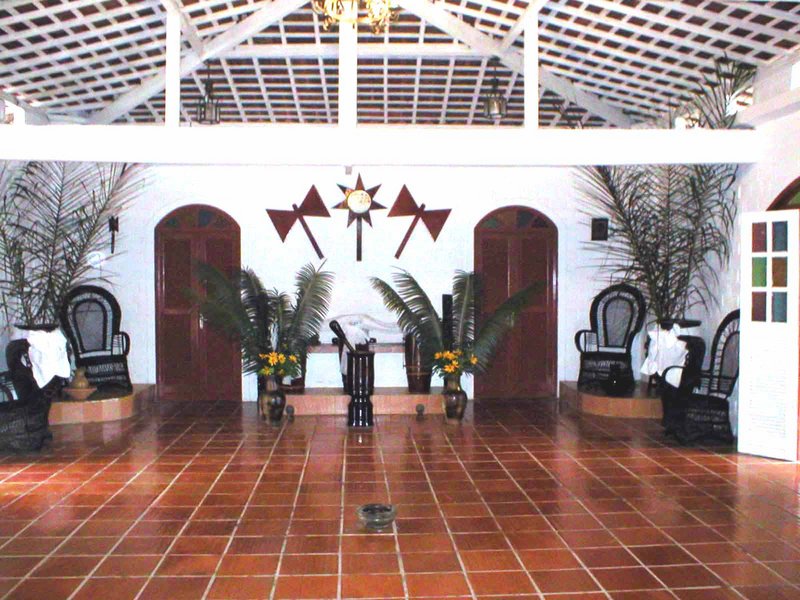
Image by Jurema Oliviera from Wikimedia
Candomblé just like Santeria in Cuba stands as another fascinating syncretic religion in the vibrant mosaic of Brazilian spirituality. This intricate belief system artfully weaves together the rich Yoruba traditions with the influence of Catholicism, creating a unique and compelling fusion of faith. Candomblé, vibrant and dynamic, pulsates at the heart of Brazil’s cultural landscape, mirroring the nation’s breathtaking diversity. From its rhythmic ceremonies and spirited dances to its colorful rituals, Candomblé encapsulates the essence of a nation where cultures converge and coexist harmoniously.
30. Mami Wata Belief
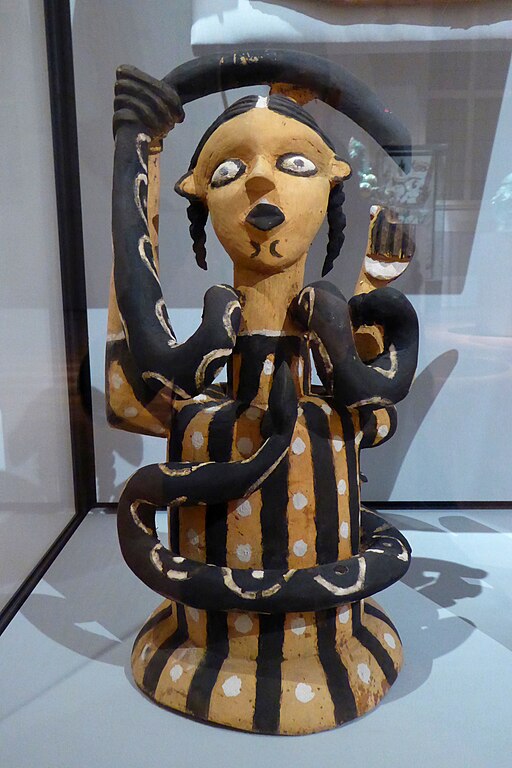
Ethan Doyle White, CC BY-SA 4.0, via Wikimedia Commons
Mami Wata, an intriguing pan-African water spirit veneration cult, finds its diverse manifestations scattered across the vast expanse of the continent. With a charm that weaves through the tapestry of Africa, this mystical belief system centers on the adoration of water spirits that often take on the captivating visage of mermaid-like beings.
This enchanting devotion defies geographic boundaries and cultural confines, uniting people under the shared reverence for these enigmatic aquatic deities. As we delve deeper into the mesmerizing world of Mami Wata, one cannot help but wonder about the profound impact of this ancient tradition on the multifaceted, ever-evolving landscape of African spirituality.
African traditional religions are a testament to the continent’s rich cultural diversity and spiritual depth. These 30 unique belief systems offer a glimpse into the intricate tapestry of African spirituality, where the natural world, ancestors, and spirits play vital roles. As we explore these traditions, it becomes evident that Africa’s spiritual heritage is not only ancient but also profoundly vibrant, continually evolving, and deserving of our respect and admiration.
Planning a trip to Paris ? Get ready !
These are Amazon’s best-selling travel products that you may need for coming to Paris.
Bookstore
- The best travel book : Rick Steves – Paris 2023 – Learn more here
- Fodor’s Paris 2024 – Learn more here
Travel Gear
- Venture Pal Lightweight Backpack – Learn more here
- Samsonite Winfield 2 28″ Luggage – Learn more here
- Swig Savvy’s Stainless Steel Insulated Water Bottle – Learn more here
Check Amazon’s best-seller list for the most popular travel accessories. We sometimes read this list just to find out what new travel products people are buying.

